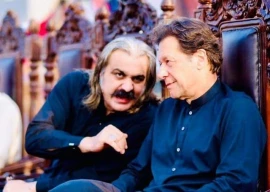
Photographs of nature, striking close-ups of the young and old and heart-wrenching tales of survival, were some of the attractions that drew visitors at Lok Virsa Heritage Museum’s photo exhibition on Saturday. The event was held to commemorate the World Democracy Day.
Though the link between the two, democracy and a photographic exhibition, was not very clear, the event aimed to show the impact media can have on promoting and raising awareness about a fair and representative government.
“Pakistanis must be sensitised on how much impact their vote has,” said Munir Ahmed, director Development Communications Network (DEVCOM-Pakistan). “We want to show that democracy is ingrained in our society through these glimpses into our culture and to emphasise that it is not a Western concept,” he said.
Local village councils are a cultural legacy and an overriding democratic government is a natural evolution of the former, Ahmed added.
Photographs by some 75 photo-journalists were on display showcasing life and culture from across the country, celebrating diversity while acknowledging a common national identity. In addition to the exhibition, a seminar, “Democratic Future of Pakistan,” was also held.
Speaking at the discussion, former foreign secretary Akram Zaki said, “Democracy is the pathway to achieve social justice which is only possible by following the eastern discipline and code of conduct.” Zaki proposed that Pakistan should coin its own version of democracy or a system that suits its unique needs and realities.
Journalist Fouzia Shahid said despite several steps to secure the democratic rights of the people, the media has taken an ambivalent stance on a number of issues driven by commercial gains and viewer ratings.
The event was organised by Devcom-Pakistan in collaboration with Lok Virsa and the Islamabad Crescent Lions Club (ICLC).
The exhibition and seminar was a prelude to the upcoming National Culture for Democracy Festival which will be held at Lok Virsa from October 18 to 21. The photographs for the exhibition were provided by members of the Pakistan Association of Photojournalists.
Published in The Express Tribune, September 16th, 2012.
COMMENTS (5)
Comments are moderated and generally will be posted if they are on-topic and not abusive.
For more information, please see our Comments FAQ

















Pakistani Photo Journalists getting momentum and Photo Exhibition of Photo Journalists from Pakistan Association of Photo Journalists deserve to be encouraged. Very good work.
Pakistani Photo Journalists getting momentum and Photo Exhibition of Photo Journalists from Pakistan Association of Photo Journalists deserve to be encouraged. I think a lot of real work is needed for the freedom of Pakistani peoples. Well done PAPJ and good job Express Tribune for this report.
Nice to see local photographers contribution
Devolution of powers and emergence of regional political parties and groups will strengthen democracy. The 18th Amendment which empowers provinces by decentralizing administrative powers will have the most significant impact on democracy in Pakistan. Blaming federation for usurping provincial authority and misleading people on the bases of such rhetorics will not influence public opinion anymore. More practical policy oriented parties will emerge to lead the people in right direction.
http://uelect.org.pk/blog/election-2013-making-democracy-work-by-mustafa-kamal/
Democracy fails because of high expectations of people. People have high expectations with political parties because they invest their time, energies and money at grassroots levels for them. Failing fulfilling such expectations create annoyance and resentment among people. That is not the case with dictators as they come to power by force and people have less affiliation with them. The expectations of people can be fulfilled by delivering result and fulfilling the political promises made with them. Democracy, in other words must be result oriented, not a mere blame game rhetoric aiming to malign the opponent political parties.
complete read here Making Democracy Work